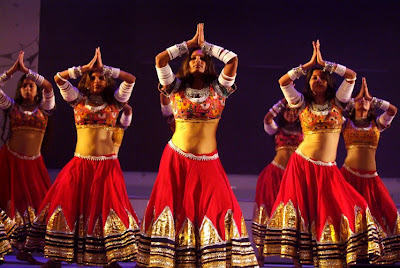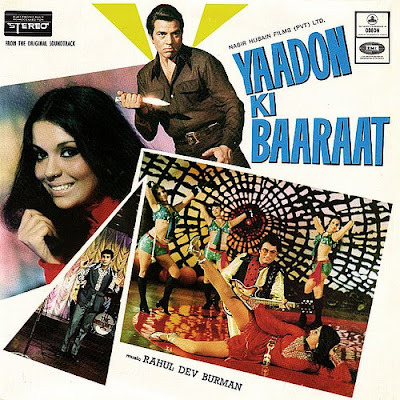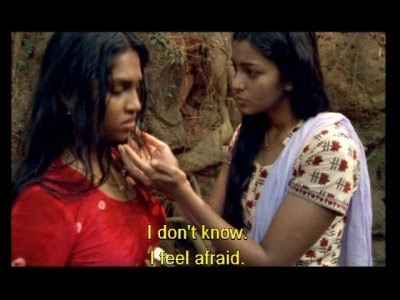 Time out for India! Whoever thought yours truly had stopped being under the spell of the Motherland . . .
Time out for India! Whoever thought yours truly had stopped being under the spell of the Motherland . . .Think again, for despite my ramblings about Paddington Bear, Muslims in the Netherlands and my darling ex-students in Almere (how great this sounds in English), I am still very much in love with that magical magnet called India.
So here goes. Every year in November the Tropentheater Amsterdam hosts the Cinema India. Yet this time things will be slightly different. Think more. Think better. Think bigger. Think the Amsterdam India Festival.
 From 12 up to and including 30 November 2008 Het Concertgebouw, together with a number of cultural organisations in Amsterdam, will organise a spectacular festival devoted to India. Their main reason for doing so is the significant role India is playing in the world, while in the Netherlands this fascinating country is relatively unknown.
From 12 up to and including 30 November 2008 Het Concertgebouw, together with a number of cultural organisations in Amsterdam, will organise a spectacular festival devoted to India. Their main reason for doing so is the significant role India is playing in the world, while in the Netherlands this fascinating country is relatively unknown.
The Amsterdam India Festival proudly presents a huge cultural array of events in the field of music, dance, fashion, photography, theatre, arts, architecture and multi-media, all revolving around the theme of Blended Cultures - referring to the large variety of the different cultures in India.
So here goes. Every year in November the Tropentheater Amsterdam hosts the Cinema India. Yet this time things will be slightly different. Think more. Think better. Think bigger. Think the Amsterdam India Festival.
 From 12 up to and including 30 November 2008 Het Concertgebouw, together with a number of cultural organisations in Amsterdam, will organise a spectacular festival devoted to India. Their main reason for doing so is the significant role India is playing in the world, while in the Netherlands this fascinating country is relatively unknown.
From 12 up to and including 30 November 2008 Het Concertgebouw, together with a number of cultural organisations in Amsterdam, will organise a spectacular festival devoted to India. Their main reason for doing so is the significant role India is playing in the world, while in the Netherlands this fascinating country is relatively unknown.The Amsterdam India Festival proudly presents a huge cultural array of events in the field of music, dance, fashion, photography, theatre, arts, architecture and multi-media, all revolving around the theme of Blended Cultures - referring to the large variety of the different cultures in India.
Below, you will find a selection (my selection) of dance, music and film. Of course, the festival has much much more to offer, so please check out their website, but not until you've browsed through my selection.
 A music selection
A music selection
Nitin Sawhney. Wednesday 12 November 21:00 hrs, Melkweg The Max. Sawhney is regarded as one of the pioneers of the Asian Underground music scene. He combines a variety of musical styles such as jazz, drum and bass, hiphop and flamenco.
 A music selection
A music selectionNitin Sawhney. Wednesday 12 November 21:00 hrs, Melkweg The Max. Sawhney is regarded as one of the pioneers of the Asian Underground music scene. He combines a variety of musical styles such as jazz, drum and bass, hiphop and flamenco.
Amjad Ali Khan & Niyazi and Nizami Brothers. Monday 17 November 20:15 hrs, Het Concertgebouw, Kleine Zaal. Discover the mysticism of India. Qawwali is the music of the mystical brotherhoods as performed at the shrines of the Muslim saints.
 The Niyazi and Nizami Brothers, who belong to the Chistiya Brotherhood, usually perform the virtuoso vocals during devotional gatherings and can captivate a concert audience with their ecstatic song.The first part of the evening is dedicated to the classical art of Ustad Amjad Ali Khan, one of India's foremost masters of the sarod, a plucked lute.
The Niyazi and Nizami Brothers, who belong to the Chistiya Brotherhood, usually perform the virtuoso vocals during devotional gatherings and can captivate a concert audience with their ecstatic song.The first part of the evening is dedicated to the classical art of Ustad Amjad Ali Khan, one of India's foremost masters of the sarod, a plucked lute.Bharati the Musical. Wednesday 19 November 20:15 hrs, Het Concertgebouw, Grote Zaal. Imagine yourself transported to India when you attend this extraordinary performance.
 Temple dancers, exhilarating music from the deserts of Rajasthan, sounds of the holy Ganges river, and the sophisticated echoes of the palaces of the Maharajas. An effervescent spectacle that takes the audience through the various facets of Indian dance and musical culture.
Temple dancers, exhilarating music from the deserts of Rajasthan, sounds of the holy Ganges river, and the sophisticated echoes of the palaces of the Maharajas. An effervescent spectacle that takes the audience through the various facets of Indian dance and musical culture.Dhroeh Nankoe (bhaithak gana) & Anup Jalota (bhajan). Thursday 20 November 20:15 hrs, Het Concertgebouw, Kleine Zaal.
When Hindustani field labourers left the Indian states of Uttar Pradesh and Bihar for the plantations of Surinam in the 19th century, they took with them their musical baggage, baithak gana. Dhroeh Nankoe learned the genre from his grandfather. Baithak gana's land of origin is also the birthplace of the nirgun bhajans. These devotional songs by the great Hindu saint and poet Kabir will be presented after the interval. At 7 pm Narinder Mohkamsing will give an introduction to Indian music and the diaspora.
 Burmania: Bollywood's funky genius. Thursday 20 November 20:00 hrs, Paradiso. During the seventies, a fresh wind of mini-skirts, garish shirts and rebellion blew through Bollywood. Sex and drugs and rock and roll entered Indian cinema. And cinema sound systems blasted out the revolutionary music of R.D. Burman. Two of his famous albums/films are Hare Rama Hare Krishna and Yaadon ki Baaraat. His experimental drive was not bound by musical genres: he mixed traditional ragas with Latin percussion, Bollywood violins with wah-wah organ, sitar with big band.
Burmania: Bollywood's funky genius. Thursday 20 November 20:00 hrs, Paradiso. During the seventies, a fresh wind of mini-skirts, garish shirts and rebellion blew through Bollywood. Sex and drugs and rock and roll entered Indian cinema. And cinema sound systems blasted out the revolutionary music of R.D. Burman. Two of his famous albums/films are Hare Rama Hare Krishna and Yaadon ki Baaraat. His experimental drive was not bound by musical genres: he mixed traditional ragas with Latin percussion, Bollywood violins with wah-wah organ, sitar with big band.
 Burmania: Bollywood's funky genius. Thursday 20 November 20:00 hrs, Paradiso. During the seventies, a fresh wind of mini-skirts, garish shirts and rebellion blew through Bollywood. Sex and drugs and rock and roll entered Indian cinema. And cinema sound systems blasted out the revolutionary music of R.D. Burman. Two of his famous albums/films are Hare Rama Hare Krishna and Yaadon ki Baaraat. His experimental drive was not bound by musical genres: he mixed traditional ragas with Latin percussion, Bollywood violins with wah-wah organ, sitar with big band.
Burmania: Bollywood's funky genius. Thursday 20 November 20:00 hrs, Paradiso. During the seventies, a fresh wind of mini-skirts, garish shirts and rebellion blew through Bollywood. Sex and drugs and rock and roll entered Indian cinema. And cinema sound systems blasted out the revolutionary music of R.D. Burman. Two of his famous albums/films are Hare Rama Hare Krishna and Yaadon ki Baaraat. His experimental drive was not bound by musical genres: he mixed traditional ragas with Latin percussion, Bollywood violins with wah-wah organ, sitar with big band. It was singer Asha Bhosle who made his sexy, breathy songs world famous. Since his death in 1994, Burman has become a legend in India. Bombay Connection revives Burman's funky genius in Paradiso, including strings, Indian percussion and a sexy Indian singer. Arranged and updated by Gerry Arling.
Dhrupad from Pakistan. Saturday 22 November 20:00 hrs, RASA, Utrecht. Dhrupad is the oldest surviving style of classical music on the Indian subcontinent. It is a modal vocal style - with a single melodic line and no harmonic parts - in which the characteristic contours and the rasa (sentiment) are presented note for note, first in the low register and then in the upper register. The resonant sound of the drum (pakhawaj) drives the tala, the time-cycle that rhythmically organizes the raga melodies, toward the final sa, the ground tone.
A film selection
Lage Raho Munnabhai. 11 - 12 November, Tropentheater, Kleine Zaal. An Indian comedy about a maffia boss who falls in love with the presentor of a popular radio programme. He pretends to be a professor in order to impress her. The plan works, but he is invited to give a lecture and lands himself in all sorts of awkward situations. Director: Rajkumar Hirani, 2006, 165 minutes, Hindi with English subtitles.
He pretends to be a professor in order to impress her. The plan works, but he is invited to give a lecture and lands himself in all sorts of awkward situations. Director: Rajkumar Hirani, 2006, 165 minutes, Hindi with English subtitles.
Apu trilogy. 13 November - 2 December; Filmhuis. Three films by the Bengalese filmmaker Satyajit Ray (1921-1992). His Apu trilogy caused a sensation in the 1950s, a triptych based on the everyday, often laborious life of the Indian. The Filmmuseum presents the entire Apu trilogy: Pather Panchali (1955), Aparajito (1956) and Apur Sansar (1958), with music by the Indian composer Ravi Shankar.
 The Last Lear. 20 November; Tropentheater, Kleine Zaal, with the legendary Amitabh Bachchan playing an aging stage actor who takes a dim view of cinema. He believes that film is unable to create anything that comes close to Shakespeare. A film about ageing, power and losing control. Director: Rituparno Ghosh, 2007, 130 minutes, in English
The Last Lear. 20 November; Tropentheater, Kleine Zaal, with the legendary Amitabh Bachchan playing an aging stage actor who takes a dim view of cinema. He believes that film is unable to create anything that comes close to Shakespeare. A film about ageing, power and losing control. Director: Rituparno Ghosh, 2007, 130 minutes, in English
Gay cinema. 22 - 23 November; Rialto Cinema. Gay India will examine the key question of what it is like to be gay under difficult, repressive circumstances. The film My Brother Nikhil, to be shown on Saturday 22 November, was the first Bollywood film to portray homosexuality openly and to broach the subject of HIV/AIDS, an awkward topic in India. Director Onir will be there to answer questions about the film.
Director Onir will be there to answer questions about the film.
Dhrupad from Pakistan. Saturday 22 November 20:00 hrs, RASA, Utrecht. Dhrupad is the oldest surviving style of classical music on the Indian subcontinent. It is a modal vocal style - with a single melodic line and no harmonic parts - in which the characteristic contours and the rasa (sentiment) are presented note for note, first in the low register and then in the upper register. The resonant sound of the drum (pakhawaj) drives the tala, the time-cycle that rhythmically organizes the raga melodies, toward the final sa, the ground tone.
A film selection
Lage Raho Munnabhai. 11 - 12 November, Tropentheater, Kleine Zaal. An Indian comedy about a maffia boss who falls in love with the presentor of a popular radio programme.
 He pretends to be a professor in order to impress her. The plan works, but he is invited to give a lecture and lands himself in all sorts of awkward situations. Director: Rajkumar Hirani, 2006, 165 minutes, Hindi with English subtitles.
He pretends to be a professor in order to impress her. The plan works, but he is invited to give a lecture and lands himself in all sorts of awkward situations. Director: Rajkumar Hirani, 2006, 165 minutes, Hindi with English subtitles.Apu trilogy. 13 November - 2 December; Filmhuis. Three films by the Bengalese filmmaker Satyajit Ray (1921-1992). His Apu trilogy caused a sensation in the 1950s, a triptych based on the everyday, often laborious life of the Indian. The Filmmuseum presents the entire Apu trilogy: Pather Panchali (1955), Aparajito (1956) and Apur Sansar (1958), with music by the Indian composer Ravi Shankar.
 The Last Lear. 20 November; Tropentheater, Kleine Zaal, with the legendary Amitabh Bachchan playing an aging stage actor who takes a dim view of cinema. He believes that film is unable to create anything that comes close to Shakespeare. A film about ageing, power and losing control. Director: Rituparno Ghosh, 2007, 130 minutes, in English
The Last Lear. 20 November; Tropentheater, Kleine Zaal, with the legendary Amitabh Bachchan playing an aging stage actor who takes a dim view of cinema. He believes that film is unable to create anything that comes close to Shakespeare. A film about ageing, power and losing control. Director: Rituparno Ghosh, 2007, 130 minutes, in EnglishGay cinema. 22 - 23 November; Rialto Cinema. Gay India will examine the key question of what it is like to be gay under difficult, repressive circumstances. The film My Brother Nikhil, to be shown on Saturday 22 November, was the first Bollywood film to portray homosexuality openly and to broach the subject of HIV/AIDS, an awkward topic in India.
 Director Onir will be there to answer questions about the film.
Director Onir will be there to answer questions about the film. The film The Journey (Sancharram), in which the young and beautiful Kiran falls in love with her best friend Delilah, will be shown on 23 November.
A dance selection
Sadanam Balakrishnan dance. Wednesday 12 November 20:15 hrs. Het Concertgebouw, Grote Zaal. Sadanam Balakrishnan presents one of India's most spectacular dance forms.
A dance selection
Sadanam Balakrishnan dance. Wednesday 12 November 20:15 hrs. Het Concertgebouw, Grote Zaal. Sadanam Balakrishnan presents one of India's most spectacular dance forms.
He comes to Amsterdam with this renowned kathakali dance company to treat the audience to this colourful and musically rich interpretation of two episodes from the Mahabharata (the longest epic poem in the world, telling the story of the genesis of India). Video screens will enable the audience to follow the characteristic facial expressions and gestures of the performers close-up.  Surtitles will make it easier to keep up with the story. Get acquainted with India's finest on this spectacular evening.
Surtitles will make it easier to keep up with the story. Get acquainted with India's finest on this spectacular evening.
Bharata Natyam dance by Leela Samson; Friday 14 November 20:15 hrs, Het Concertgebouw, Kleine Zaal. Leela Samson The devotional temple music of southern India is a source of inspiration for diverse performing arts.The padams are the musical framework for the stylised temple dances of bharatanatyam dancer Leela Samson in the second part of the evening.
Note that some events are preceded by various introductions for which an extra admission price is charged. For 7 pm: Introduction to bharatanatyam dance by Leela Samson. Admission € 5,-
 Surtitles will make it easier to keep up with the story. Get acquainted with India's finest on this spectacular evening.
Surtitles will make it easier to keep up with the story. Get acquainted with India's finest on this spectacular evening.Bharata Natyam dance by Leela Samson; Friday 14 November 20:15 hrs, Het Concertgebouw, Kleine Zaal. Leela Samson The devotional temple music of southern India is a source of inspiration for diverse performing arts.The padams are the musical framework for the stylised temple dances of bharatanatyam dancer Leela Samson in the second part of the evening.
Note that some events are preceded by various introductions for which an extra admission price is charged. For 7 pm: Introduction to bharatanatyam dance by Leela Samson. Admission € 5,-
